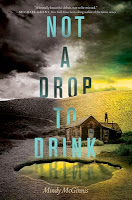When my book A Madness So Discreet was released in 2015, I had the occasional reader ask, “Why would you write a book for teens where the main character is being sexually abused by her father?”
My answer?
Because that’s who it happens to.
While my books cover the gamut of genres, they are always looking deeply into the dark corners of our world, places that some prefer not to go. My answer to that question would set the occasional person back. Others would nod knowingly. That’s who I’m writing for.
As a former high school librarian, I fully support reading for escape. I worked for 14 years in a rural, economically depressed area — the same area I grew up in and still live in. Some of my students needed to read about fantasy and fairy tales, and were desperately looking for the happily ever after that many romances promised, but reality failed to deliver.
But others needed to see themselves in the pages of the books they read — be it an alcoholic parent, an abusive relationship, a sexual-assault survivor, or just a hardscrabble kid down on their luck looking for a way out. Where I’m from, luck runs thin, and there aren’t many ways out.
I began writing for teens in 2010 after years of handing my students books set in the glitz of big cities, often following lives of the famous or wealthy. Characters in these books had handbags that cost more than my students’ entire wardrobes, and they certainly didn’t walk to school or have to worry about not having a coat to wear when the temperatures dropped. I wanted rural kids to see themselves and their struggles in fiction, so I set out to do just that.
When I wrote The Female of the Species in 2016 — a rape-revenge, vigilante-justice story — I fully expected it to be banned. Instead, my inbox filled with upraised fists, shared experiences, and heartfelt thank yous. A woman in her forties told me that if she’d had that book growing up, she would have reported her attacker. The grit in those pages was hard for many readers, but for many more it was an abrasion they have felt before and known too well. To see it play out differently this time — and with a note of hope at the end — was a balm.
Writing Heroine, which is about the opioid epidemic, was no different.
I pride myself on not pulling punches, but this was one story where I didn’t know what to strike out at. Anger drove The Female of the Species, but tales of addiction don’t have an obvious villain. Holding big pharma responsible for their role in the epidemic will be key in reality, but for fiction I needed a smaller picture, an emotional foothold rather than an agenda. As it turns out, that foothold was easy to find. Too easy.
In the late spring of 2017, I was visiting a school in southern Ohio — an area hard hit by the opioid crisis and considered by many to be the epicenter. As I spoke with the librarians and educators over lunch, they told me that their local economy was struggling. No one carried cash any longer, they paid each other in pills. If you lived there, I was told, you had a few employment opportunities — the school, the prison, the hospital, or...you sold drugs. You can guess which one paid the best.
This wasn’t said judgmentally, but with true grief. They were watching their students overdose and their own friends and families succumb. A complicated mix of sympathy and confusion clouded their words, along with a sense of urgency and need for hope. I drove home thinking of them, their students, and of the people in my own life who have been pulled into the vortex. A phrase they used at lunch stuck with me, and I’ve heard it repeated multiple times when I meet educators, reviewers, librarians, booksellers, and readers: Everyone knows someone.
That someone is an every person — not a different race, not a homeless woman on the street, not the rough guy hanging out in the parking lot. It’s the girl sitting next to you in math class, the parent who runs the carpool, or the athlete who needs to push past the pain in order to perform.
When writing Mickey, my main character in Heroine, it was important to make her goals the reader’s goals. I’ve had readers tell me they were almost rooting for Mickey to get her next fix because that is what she needed to “be well” enough to walk out onto the softball field and catapult her team into the spotlight. The slippery logic of addiction is at work in Mickey and wheedles its way into the reader as well, creating the all-important element of empathy.
I’d like to see Heroine performing in reverse to my original goals as a writer. My readers may indeed see themselves in these pages. But more importantly, I want them to see Mickey in the people around them. And if they can feel for her, maybe they can feel for them, too.
Realism is a large part of what I deliver with my writing, and Heroine is no different. There is no neat answer, no happy ending. What I bring with my fiction is what I felt was needed at that lunch meeting, and in all of our lives right now: some hope.
As with my other works, there is darkness. As with my other works, I wrote it because it’s honest about what’s happening. But in this case, it’s not just for teens.
It’s happening to all of us.
























